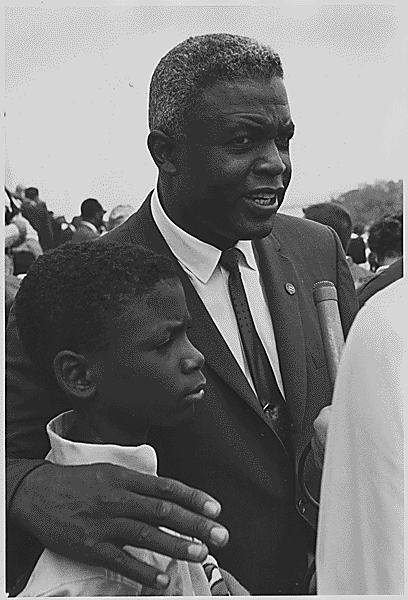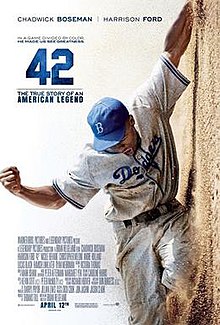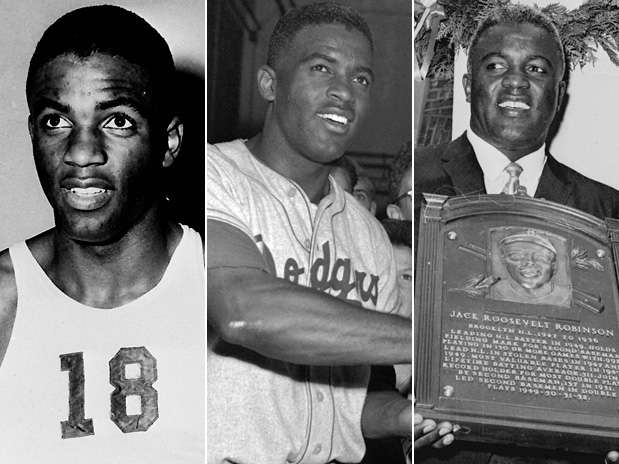I saw "42" this past weekend and I went in worried they would sanitize his story and Hollywood-ize to make it some feel good piece. I was wrong because it was quite solid.
While the movie didn't introduce anything new to me, it did show the strength Jackie had as well as how much he needed the support of his wife, Rachel, to be his rock. It showed that Jackie often had to go it alone and despite having Rachel, a few teammates and legendary newspaper scribe Wendell Smith by his side, he had to face the abuse and loneliness in 1947.
I loved how it showed that Jackie only didn't fight back because he was told to, not because it was his nature. We have a way of thinking that our civil rights icons were passive aggressive and it demeans their struggle by making them appear weak compared to folks like Malcolm X, Stokley Carmichael and the Black Panthers.
(Let's clear up that logic now. 1) He grew up in California and attended UCLA so he wasn't uncomfortable speaking up to White people. 2) He was court-martialed in the Army for refusing to moving to the back of the bus and later acquitted. 3) Branch Rickey told him that in 1949, he was free to be himself. Not fighting back is a tactic, not a sign of weakness or lack of passion)
It also bears noting that Robinson's impact on the Dodgers was immediate. He helped the Dodgers win six pennants and the 1955 World Series. Thanks to the team integrating with Roy Campanella and Don Newcombe, they sustained excellence while peers (esp. the American League) played catch-up.
Robinson wasn’t the best Black ballplayer selected to be the first – Satchel Paige, Josh Gibson and many others could stake that claim – but he became a Hall of Fame second baseman and one of the best to ever play the position. It’s not surprising he used the skills that made him a 4-sport star at UCLA.
Jackie changed the game not just by color but by bringing in a Negro League style of play - hit and run, being aggressive on the basepaths and using the steal as a weapon even more than Ty Cobb did. It was a style that would influence the 60's as the National League began dominating the majors behind Black players.
The movie did a great job showing his strength and Harrison Ford did a great job as Branch Rickey. Even though my opinion on Rickey has soured due to learning that he didn’t compensate Negro League teams for finding Black talent, he should still be commended for forcing baseball to make a change it had to make. I also give credit to then-Commissioner Happy Chandler who publicly went on record encouraging integration.
 |
| Jackie Robinson attended the March on Washington with his son, Jackie Jr. |
However, I don’t want to forget Jackie’s life after baseball. He marched for civil rights in the movement that he helped to inspire. He spoke on behalf of Curt Flood when Flood sued MLB to destroy the reserve clause and be a free agent, something that moved Flood to tears. To his dying day, Jackie was bitter about the lack of Black managers and executives in the game - an issue that still affects other sports besides baseball.
That’s what inspires me. Jackie lived how he played – aggressive, passionate and committed. He died far too young from diabetes but is also a reminder that being the first to do something takes a toll on the body too.
I don't want to just remember his legacy. I want to honor it. Remembering is something you do as a formality that requires little action. Honoring is putting more emphasis on the ongoing action than just nodding your head and passing by.
We’d celebrate things like the Atlanta Braves’ all-Black outfield, CC Sabathia/David Price as elite pitchers, Matt Kemp as an incredible all-around player, and Andrew McCutcheon/Prince Fielder as great young talent among others.
I want to celebrate kids who are still playing baseball and showing folks baseball isn’t just a White/Latino sport. One of my last features as sports editor was on Dominic Smith, then a freshman standout that’s now grown into one of the top seniors in California and might be drafted this year. His team this year is loaded with kids that I hope to see at some point.
This is how I want to honor Jackie’s legacy. Keep fighting for change in sports and celebrate those who are making an impact. Remembering that over the last 25 years of his life, he didn’t give up and even fought against the very game he tried to change.
Jackie Robinson is one of the finest citizens this country - my state! - has produced. Wearing #42 is a proud gesture and I hope that as we continue to educate the youth on him, we educate ourselves on why he shouldn't just be remembered every April 15th.



No comments:
Post a Comment